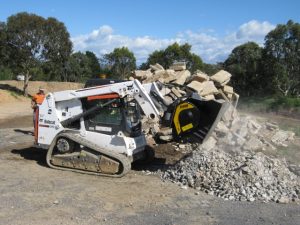Environmental considerations and the high cost of landfill disposal is a growing and common challenge for local government. The problem looms even larger if waste disposal depots are located some distance away, adding further costs.
Local government jurisdictions in regional centres often span large areas and include towns and villages that are widely dispersed, adding time and cost when local infrastructure needs an upgrade or repairs are needed.
With six towns and seven villages spread across 6,300 square kilometres on the south coast of New South Wales, Bega Valley Shire Council was facing the task of repair and replacement of large sections of concrete kerbing ahead of some major road reconstruction projects.
Bega Shire works engineer Jason Heffernan said, “considerable work was needed to remove crumbling or damaged concrete kerbs and gutters. Over time, the ravages of water and heavy transport vehicles such as residential waste collection trucks can cause substantial damage. Often, whole sections of footpath and stormwater infrastructure needs to be replaced.
“As part of the solution of replacing these concrete assets, we wanted to look at the possibility of reusing as much waste material as possible, which makes sense both from a cost and environmental viewpoint. Council views concrete as a reusable resource and is committed to being environmentally responsible by reducing landfill wherever possible.
“With limited landfill facilities, the reduction of council waste is a high priority to ensure the needs of residents and businesses are met by having space for disposal of household and commercial waste.
“Due to the volumes involved concrete recycling was targeted as a priority so we spoke with our regular contractors to see what could be achieved. Michael Grant of Bega Bobcats came up with a practical solution that has been working very well for us.”
Crushing is part of the solution
 “The solution came in the form of an MB L140 crusher bucket being attached to a skid steer loader which enables all recovered concrete to be crushed and recycled into usable material having established that it is not contaminated with asbestos products or similar.
“The solution came in the form of an MB L140 crusher bucket being attached to a skid steer loader which enables all recovered concrete to be crushed and recycled into usable material having established that it is not contaminated with asbestos products or similar.
“Michael Grant said that “From the time we purchased the MB crusher it started saving a lot of time and money, while giving us good quality material. The L140 crusher enables concrete, rocks, tiles and other hard materials to be crushed for re-use as an alternative to rock mulch.
“In many instances we don’t need to purchase materials and it’s saving us time and money as well as achieving Council’s objectives of reducing vehicle movements and landfill costs. Recycling material enables us to bulk up our road base with a 50 per cent mixture of road base with our recycled crushed product, saving 50 percent on back-fill.
“While using the MB crusher bucket can save more on some jobs than others, we have calculated the money we are saving can easily justify the investment. For example, disposal of 240 tonnes of concrete costs $250 per tonne. Over time, these cost savings become very significant, particularly when other costs such as the tipper operator, time and fuel are added.
“In disposal costs of concrete waste alone we save a four hour round trip comprising $400 worth of equipment time plus an average of $1,500 in tip fees. This means we save a thousand dollars on one job alone.
“In another example, we have recently excavated 240 square metres of concrete footpath, and we were able to crush 100 per cent of this material into reusable road base. If we had to dispose of this material it would have cost Council in the region of $18,000 in disposal fees however being able to crush and recycle, the cost to Council was just $6000. The other obvious benefit is the saving of landfill resources.
“The winners are the residents of Bega Shire whose council has been able to contain costs and achieve a positive environmental outcome. Concrete waste recycling is the way forward for local councils and this solution will become more important in the future as many of our residential areas come under increasing pressure from population growth”,


